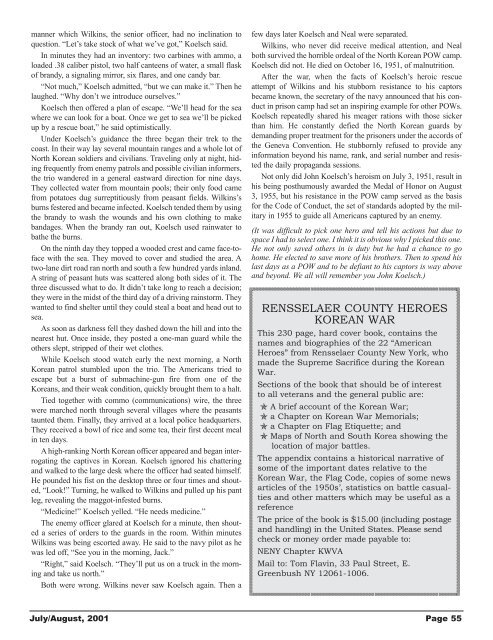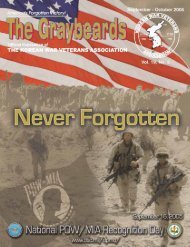The Graybeards - Korean War Veterans Association
The Graybeards - Korean War Veterans Association
The Graybeards - Korean War Veterans Association
You also want an ePaper? Increase the reach of your titles
YUMPU automatically turns print PDFs into web optimized ePapers that Google loves.
manner which Wilkins, the senior officer, had no inclination to<br />
question. “Let’s take stock of what we’ve got,” Koelsch said.<br />
In minutes they had an inventory: two carbines with ammo, a<br />
loaded .38 caliber pistol, two half canteens of water, a small flask<br />
of brandy, a signaling mirror, six flares, and one candy bar.<br />
“Not much,” Koelsch admitted, “but we can make it.” <strong>The</strong>n he<br />
laughed. “Why don’t we introduce ourselves.”<br />
Koelsch then offered a plan of escape. “We’ll head for the sea<br />
where we can look for a boat. Once we get to sea we’ll be picked<br />
up by a rescue boat,” he said optimistically.<br />
Under Koelsch’s guidance the three began their trek to the<br />
coast. In their way lay several mountain ranges and a whole lot of<br />
North <strong>Korean</strong> soldiers and civilians. Traveling only at night, hiding<br />
frequently from enemy patrols and possible civilian informers,<br />
the trio wandered in a general eastward direction for nine days.<br />
<strong>The</strong>y collected water from mountain pools; their only food came<br />
from potatoes dug surreptitiously from peasant fields. Wilkins’s<br />
burns festered and became infected. Koelsch tended them by using<br />
the brandy to wash the wounds and his own clothing to make<br />
bandages. When the brandy ran out, Koelsch used rainwater to<br />
bathe the burns.<br />
On the ninth day they topped a wooded crest and came face-toface<br />
with the sea. <strong>The</strong>y moved to cover and studied the area. A<br />
two-lane dirt road ran north and south a few hundred yards inland.<br />
A string of peasant huts was scattered along both sides of it. <strong>The</strong><br />
three discussed what to do. It didn’t take long to reach a decision;<br />
they were in the midst of the third day of a driving rainstorm. <strong>The</strong>y<br />
wanted to find shelter until they could steal a boat and head out to<br />
sea.<br />
As soon as darkness fell they dashed down the hill and into the<br />
nearest hut. Once inside, they posted a one-man guard while the<br />
others slept, stripped of their wet clothes.<br />
While Koelsch stood watch early the next morning, a North<br />
<strong>Korean</strong> patrol stumbled upon the trio. <strong>The</strong> Americans tried to<br />
escape but a burst of submachine-gun fire from one of the<br />
<strong>Korean</strong>s, and their weak condition, quickly brought them to a halt.<br />
Tied together with commo (communications) wire, the three<br />
were marched north through several villages where the peasants<br />
taunted them. Finally, they arrived at a local police headquarters.<br />
<strong>The</strong>y received a bowl of rice and some tea, their first decent meal<br />
in ten days.<br />
A high-ranking North <strong>Korean</strong> officer appeared and began interrogating<br />
the captives in <strong>Korean</strong>. Koelsch ignored his chattering<br />
and walked to the large desk where the officer had seated himself.<br />
He pounded his fist on the desktop three or four times and shouted,<br />
“Look!” Turning, he walked to Wilkins and pulled up his pant<br />
leg, revealing the maggot-infested burns.<br />
“Medicine!” Koelsch yelled. “He needs medicine.”<br />
<strong>The</strong> enemy officer glared at Koelsch for a minute, then shouted<br />
a series of orders to the guards in the room. Within minutes<br />
Wilkins was being escorted away. He said to the navy pilot as he<br />
was led off, “See you in the morning, Jack.”<br />
“Right,” said Koelsch. “<strong>The</strong>y’ll put us on a truck in the morning<br />
and take us north.”<br />
Both were wrong. Wilkins never saw Koelsch again. <strong>The</strong>n a<br />
few days later Koelsch and Neal were separated.<br />
Wilkins, who never did receive medical attention, and Neal<br />
both survived the horrible ordeal of the North <strong>Korean</strong> POW camp.<br />
Koelsch did not. He died on October 16, 1951, of malnutrition.<br />
After the war, when the facts of Koelsch’s heroic rescue<br />
attempt of Wilkins and his stubborn resistance to his captors<br />
became known, the secretary of the navy announced that his conduct<br />
in prison camp had set an inspiring example for other POWs.<br />
Koelsch repeatedly shared his meager rations with those sicker<br />
than him. He constantly defied the North <strong>Korean</strong> guards by<br />
demanding proper treatment for the prisoners under the accords of<br />
the Geneva Convention. He stubbornly refused to provide any<br />
information beyond his name, rank, and serial number and resisted<br />
the daily propaganda sessions.<br />
Not only did John Koelsch’s heroism on July 3, 1951, result in<br />
his being posthumously awarded the Medal of Honor on August<br />
3, 1955, but his resistance in the POW camp served as the basis<br />
for the Code of Conduct, the set of standards adopted by the military<br />
in 1955 to guide all Americans captured by an enemy.<br />
(It was difficult to pick one hero and tell his actions but due to<br />
space I had to select one. I think it is obvious why I picked this one.<br />
He not only saved others in is duty but he had a chance to go<br />
home. He elected to save more of his brothers. <strong>The</strong>n to spend his<br />
last days as a POW and to be defiant to his captors is way above<br />
and beyond. We all will remember you John Koelsch.)<br />
RENSSELAER COUNTY HEROES<br />
KOREAN WAR<br />
This 230 page, hard cover book, contains the<br />
names and biographies of the 22 “American<br />
Heroes” from Rensselaer County New York, who<br />
made the Supreme Sacrifice during the <strong>Korean</strong><br />
<strong>War</strong>.<br />
Sections of the book that should be of interest<br />
to all veterans and the general public are:<br />
✯ A brief account of the <strong>Korean</strong> <strong>War</strong>;<br />
✯ a Chapter on <strong>Korean</strong> <strong>War</strong> Memorials;<br />
✯ a Chapter on Flag Etiquette; and<br />
✯ Maps of North and South Korea showing the<br />
location of major battles.<br />
<strong>The</strong> appendix contains a historical narrative of<br />
some of the important dates relative to the<br />
<strong>Korean</strong> <strong>War</strong>, the Flag Code, copies of some news<br />
articles of the 1950s’, statistics on battle casualties<br />
and other matters which may be useful as a<br />
reference<br />
<strong>The</strong> price of the book is $15.00 (including postage<br />
and handling) in the United States. Please send<br />
check or money order made payable to:<br />
NENY Chapter KWVA<br />
Mail to: Tom Flavin, 33 Paul Street, E.<br />
Greenbush NY 12061-1006.<br />
July/August, 2001 Page 55

















